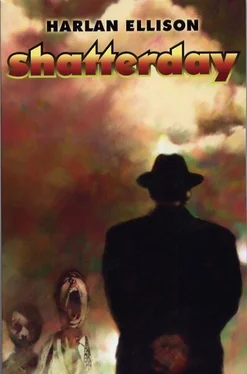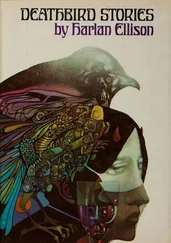He said, “How’d she take it?”
I said, “Not terrific.”
He nodded, thought about it a minute, then called Mia over. He took her aside, whispered at her for a little while, then sent her back to the table. She bent down over the old, old woman, whispered in her ear for a while longer, and when she straightened up the old, old woman was grinning wide as a death’s head. Her mouth was a classic argument for compulsory remedial orthodontia.
Whatsername sat down and smiled, waiting.
Then the old, old woman said something sharp and hard. In Hungarian. Everybody shut up and stared at her. Then she said something else, not quite as sharp and hard, and the thirty-year-old guy packing the Holland Tunnel bowed his thorny head, nodded in supplication, and murmured words of acquiescence.
The fifty-year-old spoke rapidly to the Ghost of Mia Past, every once in a while pointing at Jimmy or me, or Jimmy and me. Once, damned sure, he was making a threat; and once, damned certain, he was giving warning. She nodded, said okay okay okay every few sentences, added a thought here and there and, finally, it all seemed settled.
She got up, came over to us, and said, “All set. Do your stuff, Kerch.”
He gave her a little kiss and started toward the old black two-handed pedestal telephone on the kitchen counter. I asked the Memory of Mia, “What’s all set?”
She patted me on the cheek and answered, “They’re not going to cut you into small pieces and leave you in garbage cans all over the South Side.” Then she went away, to join my best friend, Kercher Oliver James Crowstairs, who had brought me along into the jaws of death on a “dangerous mission of research.”
It was not till a week later, after the gypsy bank robbers had given themselves up with attendant headlines and photos of Jimmy leading them out of the tenement into the waiting arms of Irv Kupcinet, the Mayor of Chicago and the bureau Chief of the Midwest Regional FBI office (not to mention several thousand cops and G-Men armed for the apocalypse), that Kerch bothered to tell me that what had saved our lives was Mia’s imparting to her dear old Granny the information that I was a close family friend of everyone on The Edge of Night and that when (or if) Granny ever got sprung from the federal slam, I would introduce her to Laurie, Vic Lamont, Simon Jessup, Orin Hillyer, Cookie, Nicole and Adam Drake, whoever the hell they were!
“My name is Kercher O. J. Crowstairs,” said the Kercher O. J. Crowstairs three times life-size on the screen before us. The camera pulled back into a medium shot and Jimmy up there whipped open the wallet lying on the desk. He pulled out a sheaf of cards and held the first one up to the camera, which obligingly zoomed in for a closeup. Jimmy’s voice, off-camera, said, “ And this is my driver’s license, issued by the state of California. You’ll notice it has a rather unflattering photograph of me right here in the lower left-hand corner, which will identify me as the one and only K. O. J. Crowstairs, your friendly neighborhood testator.”
The camera had slowly pulled back to include the attorney, Kenneth L. Gross. He was making a small moue at Jimmy’s levity. The moue became a stricture as Jimmy held up one card after another:
“And this is my BankAmericard/Visa card; and this is my Master Charge card; and this is my Diners Club card, but I don’t use it much; and this is my Carte Blanche; and this one will rent me a Hertz, and this one an Avis, and this one will get me a tacky room in any Holiday Inn across the face of the Earth; and this one is for Neiman-Marcus, and this one is for good old Bloomingdale’s, and…”
He must have caught the strangled moan from Gross, because he stopped. He dropped the rest of the thick pack of cards, and looked into the camera.
“Look: we’re doing this videotape so no one, and that means no one will be able to raise the question of my competency after I’ve croaked. By competency they mean was I of sound mind and body, and under no duress, such as being held captive by the Symbionese Liberation Army. But if I played it absolutely straight, and didn’t laugh at all this somber bullshit, then anyone who’s known me more than ten minutes would suspect I was out of my skull.
“Nonetheless…” and he said this hurriedly, because Gross was making the kind of strangling noises that, had he uttered them in a good restaurant, would have brought the maitre d’ running to administer the Heimlich Maneuver, “nonetheless, moving right along to the serious stuff, folks, here’s my friend and advisor, the world-famous corporate attorney, Mr. Kenneth L. Gross, who’d like to say a few words. Let’s give him a big funeral day welcome… Kenny Gross!”
The attorney was the color of old toothpaste as he read from a prepared form. “Mr. Crowstairs, you have now established your identity for those who may be seeing this recording at a later date. You have retained this office in connection with estate planning and more specifically to prepare your will. The document I now show you (handing will to client), is the final draft of that will. Would you please take a moment to review it?”
The screen now went to split-frame, the right side being a copy of the will. Jimmy took the document Gross handed him and scanned it. “But this is a laundry list, Kenny.” The attorney damned near fainted. Jimmy laughed and hurriedly corrected himself. “I’m kidding, I’m just kidding; this is my will; honest to God, I swear it is!”
Gross was breathing hard. I felt for the poor devil. “Is this the document that you have, hopefully, previously read?”
“Yes, it is. But you don’t mean hopefully, Kenny. You mean I hope, or it is to be hoped, or one hopes. You see, when you use the word ‘hopefully,’ you’re reporting a subjective state of mind; that is, full of hope. Your error is in attributing your hope to the object, in this case the will… or is the object me? I’m never really sure of parts of speech. In any case, if you were to reverse the word, you’d see how wrong it’s being used: hopelessly I’ve read it. See what I mean? Good grammar, Kenny; always good grammar. Your mother and I have chided you about this on numerous occasions…”
Gross exploded. “Mister Crowstairs! If you will, sir! This is a serious undertaking! Now is this, or is this not the document previously read by yourself?”
“It is, it is! Nag, nag, nag.”
Gross gave it up. He bulled. forward. Not happily. “Are you executing this document or prepared to execute this document… no, wait… I’m out of sequence! Damn it, Kerch!”
Jimmy grinned infectiously. He was never happier than when he was stirring up the soup. He laid a placating hand on Gross’s. “Take it easy, Kenny. Don’t fumfuh.”
Gross swallowed; as they say, he looked daggers at his client, pulled a weathered pipe with a large Oom Paul bowl and a bent stem from his vest pocket, puffed it alight with a kitchen match taken from his other vest pocket, harrumphed once, and began again
“All right, then: In my presence, and in the presence of these witnesses, and cognizant of the fact that these proceedings are being videotaped, does this document reflect your exclusive and entire wishes with regard to the disposition of your property?”
Testator responded in the affirmative: “I respond in the affirmative.”
The attorney now turned to the three witnesses. “Each of you has known Mr. Crowstairs for many years. You have been asked to participate in these proceedings for the purpose of further identification. Will you now, each in turn, declare who you are, your relationship to Mr. Crowstairs, and verify that this is, in fact, Mr. Kercher Oliver James Crowstairs.”
Читать дальше












